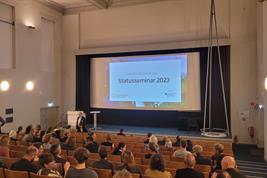06.10.2023

The fourth status seminar of the BMBF funding line "Agricultural Systems of the Future" took place on 26-27 September 2023. At the conference, which was attended by over 150 participants, the eight consortia and the coordination office presented their project progress and professional communication activities at the Archenhold Observatory in Berlin. A special focus this year was on the cooperation of the consortia to develop and implement new innovations and their transfer activities.
After the opening remarks by Monika Schreiner (IGZ) and Thomas Weith (ILS), co-directors of the coordination office, Christina de Wit, head of the Department for Sustainable Management and Bioeconomy at the Federal Ministry of Education and Research (BMBF), started the event with a welcoming speech. She assessed the funding line as a successful model and quoted Albert Einstein, who gave his first lecture on the theory of relativity at the Archenhold Observatory: "The whole is more than the sum of its parts". And she emphasised that "long-term and genuine solutions can only emerge if action is taken together and holistically, if - as in the case of the "agricultural systems of the future" - researchers and practitioners work together, there is close cooperation with industry and associations, and the public is involved. She stressed out that the consortia contribute significantly to creating sustainable and resilient agricultural systems. These goals are also laid down in the coalition agreement, the Future Strategy for Research and Innovation and the National Bioeconomy Strategy.
Stefanie Molthagen-Schnöring, Vice President for Research and Transfer and professor of science communication at the Berlin University of Applied Sciences, then outlined in her keynote speech how the transfer of scientific knowledge can succeed. "The transfer between science and the public is a constant loop and mutual translation process." Molthagen-Schnöring advised against addressing a diffuse broad public, it would never be possible to reach everyone at the same time through communication, a more specific, selected target group would be necessary. Her recommendation for the "Agricultural Systems of the Future" was to address the youth, as they are the decision-makers of tomorrow and multipliers to other target groups. She also mentioned politics as a relevant target group for a successful transfer.
Following the keynote, four consortia presented their project progress: NOcsPs, Fahrerkabine 4.0, food4future and DAKIS reported on their field tests, the implementation of real laboratories and pilot plants, the dialogue with affected stakeholders from politics to consumers and practitioners, and gave an overview of a large number of new publications. The presentations of the consortia were complemented by poster presentations in which young scientists presented individual topics of the consortia in greater depth.
In the report of the coordination office, Rebecca Klopsch and. Thomas Weith (ILS) presented the activities of "Agricultural Systems of the Future" in public relations and at events and gave an insight into inter-consortium workshops and fields of action, as well as in the cooperation of the consortia. Afterwards, Dagmara Weckowska (FU Berlin) from the food4future consortium, Thomas Weith (ILS) from the coordination office, and Marcus Geimer (KIT MoBiMa) from the Fahrerkabine 4.0 consortium presented the background and impact of responsible research practice on technological innovation processes that can lead to social change. Marcus Geimer gave practical insights into the implementation of innovations with science using the example of successfully implemented work at KIT.
On the second day of the status seminar, four further consortia - GreenGrass, RUN, SUSKULT and CUBES Circle - presented the results of their work to date:
In the session "Pathway to Impact", Thomas Weith (ILS) and representatives of the consortia presented inter-consortia working groups that work together on selected priority topics. The working groups were developed in workshops by the consortia of the funding line themselves from the transformation pathways and fields of action. Two groups have already started their work on the topics of governance and sustainability and were able to report initial successes. In addition, there was an insight into the planned action in the second funding phase of the "Agricultural Systems of the Future".
In the closing remarks Monika Schreiner and Thomas Weith from the coordination office emphasised the importance of the work done so far by all consortia and their exchange with each other, as the strategic cooperation of the consortia can now be continued in order to advance the technological and social transformation of agricultural systems.
